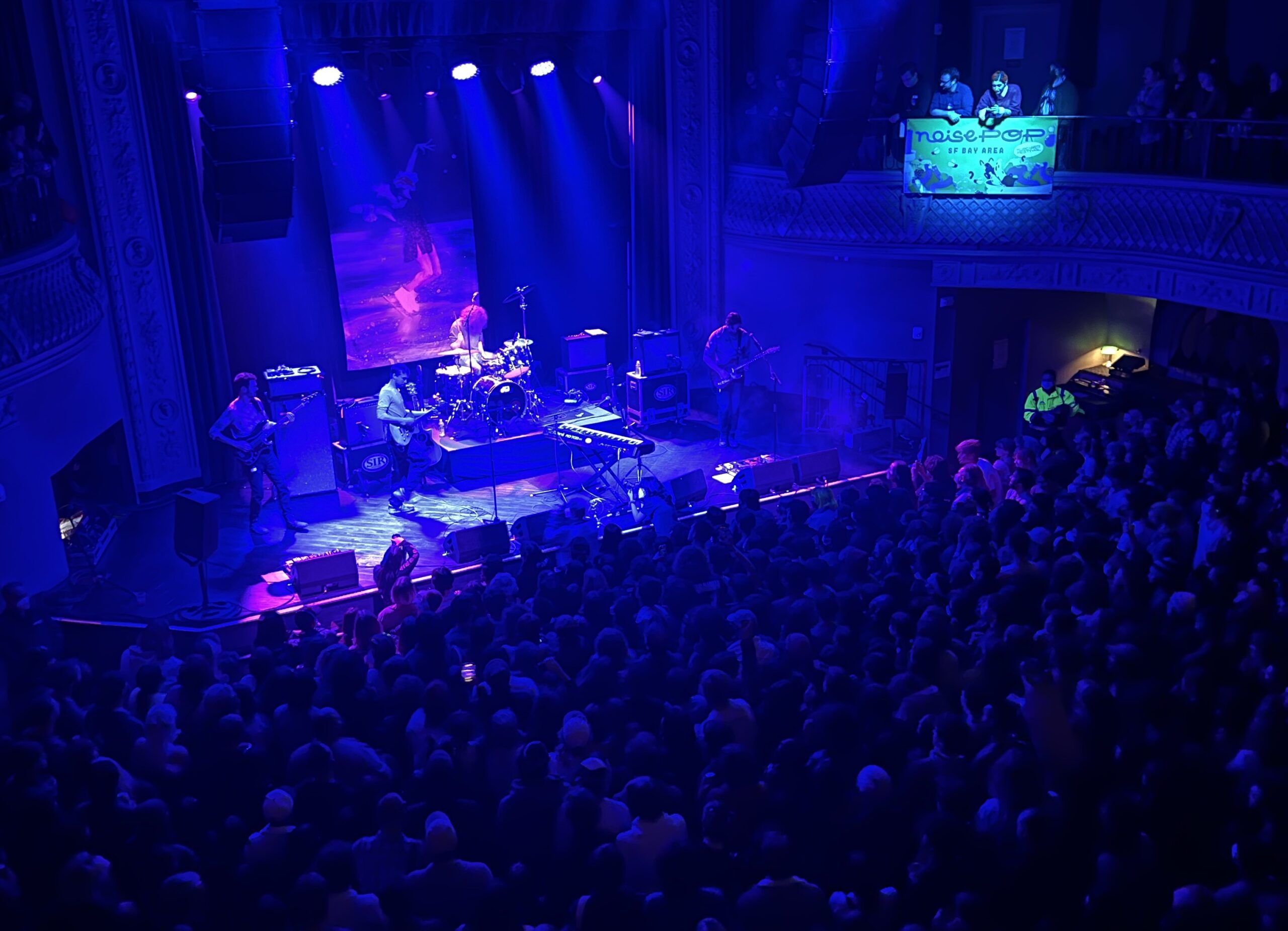Stop me if you’ve heard this one before: We’re finally turning the corner on Covid.
If you’re skeptical, I’m not surprised. In April 2020, a glowing profile in The Atlantic declared that Mayor London Breed’s pioneering pandemic policies had “flattened the curve.” Then came the hollow promise of Hot Vax Summer. Just as we were recovering from the whiplash of Delta, along came Omicron.
But something feels different this time. Maybe I’m just finally over it. But given what I saw this weekend at the 29th annual Noise Pop Festival, I’m definitely not the only one.
It was clear in the way that the crowd at Bender’s shamelessly boogied to the G-funk rhythms of hometown party-starters Analog Dog last Tuesday. It was obvious in the unbridled joy of the crowd surfer at August Hall who adjusted her mask while floating on an undulating sea of hands during a country-fied Alex G set Thursday night. It was plain to see at Gray Area on Sunday: Attendees sat elbow-to-elbow listening to avant-garde composer William Basinski—some of them maskless for the entire performance.
All of that might be anecdotal evidence, but the Noise Pop Festival—which unfolded across 21 of the city’s bars, nightclubs, art spaces and concert halls from Feb. 21 to 27—was the strongest indication I’ve yet seen to support the assertion that San Francisco is ready to stop worrying and learn to live with Covid.
Organizers estimate more than 20,000 concertgoers showed up for the festival, taking in more than 130 sets by national touring acts and rising local bands alike. And unlike the throngs who attended Outside Lands in late October, just about every show was hosted indoors, with patrons moshing and sweating and singing along.
“I’m not going to make any bets that this is over,” Noise Pop Founder Kevin Arnold told me late last week. “But there’s a sense of wanting to get back out there. It feels good to be a little bit more normal.”
It did feel normal—for the most part.
I’m still not quite used to pulling out both my proof of vaccination and driver’s license at the door, but I’m getting the hang of it. And judging by the turnout at this year’s Noise Pop, plenty of others are as well.
After opening in May of 2018, August Hall didn’t quite make it to its second anniversary before the pandemic derailed the entire live music industry. Josh Lieberman, general manager of the Union Square venue, likened the experience to “starting a car, going 70 miles per hour and then slamming on the breaks.”
Although August Hall began hosting shows again in September of 2021, Lieberman said even the biggest headliners the venue booked—including Chromeo and Erykah Badu—drew smaller crowds than the venue had hoped for.
But during last week’s festival, he saw a shift.
“We’ve seen a lot more folks coming to shows for Noise Pop than other big-ticket bills,” Lieberman said. At the Alex G show on Feb. 24, they had about 800 patrons come through the door, which is just 50 shy of capacity.
He notes that the bump in attendance could be due to a number of factors—from shifting government mandates to changing comfort levels—but he believes the festival’s name certainly helps.
“It’s always been one of those things that gives a focal point for a lot of bands to come and be heard,” Lieberman said of the Noise Pop banner.
Ben Rauch, who was at August Hall for Alex G, said the concert was his first in two years. “I would say we needed to come out very badly,” he said, exchanging a knowing look with his wife, who will soon be giving birth to a baby boy. Though he wasn’t sure whether he will be able to attend many shows in the near term, he said that as long as his in-laws keep their promise of pitching in with babysitting and the community spread of Covid is beneath a reasonable threshold that he’d feel comfortable coming out again.
Dana Smith was also attending the Alex G show on Thursday night and said they felt comfortable being indoors—with the added protection of a vaccine and a high-quality mask.
“I think it’s really important to support artists, to support venues—they’ve had a really rough couple of years—and it is amazing that Noise Pop could happen at all, all things considered,” Smith said. “So we’re happy to be here, we’re happy to support artists and all the great folks in San Francisco who make night life here such a part of the city.”
As longtime industry veterans, Arnold and Lieberman would surely take heart to know that fans are thinking about the entire ecosystem that supports live music in San Francisco. In fact, both noted that one silver lining of the pandemic has been that venues have banded together like never before.
“There were a lot of downs in the beginning—venues were absolutely devastated,” Arnold said. But these days he’s seeing many more “positives” from his peers. “To see that community come together is a big step.”
There was a moment in the midst of Alex G’s set when I felt something I hadn’t felt in quite a while. It was similar to the jubilation I felt as a teenager going to a show on my own for the first time.
As a lifelong music fan who has worked for the better part of a decade writing about indie rock, hip-hop, jazz, electronic and classical music, attending concerts can often feel more academic than spontaneous—more like a job than a passion. And like Arnold, after so many false glimmers of light at the end of the Covid tunnel, I’m hesitant to say that live music is definitively back in San Francisco.
But after a week of basking in amazing performances in the midst of energized crowds, I can definitely say I know exactly why I want it to return.
